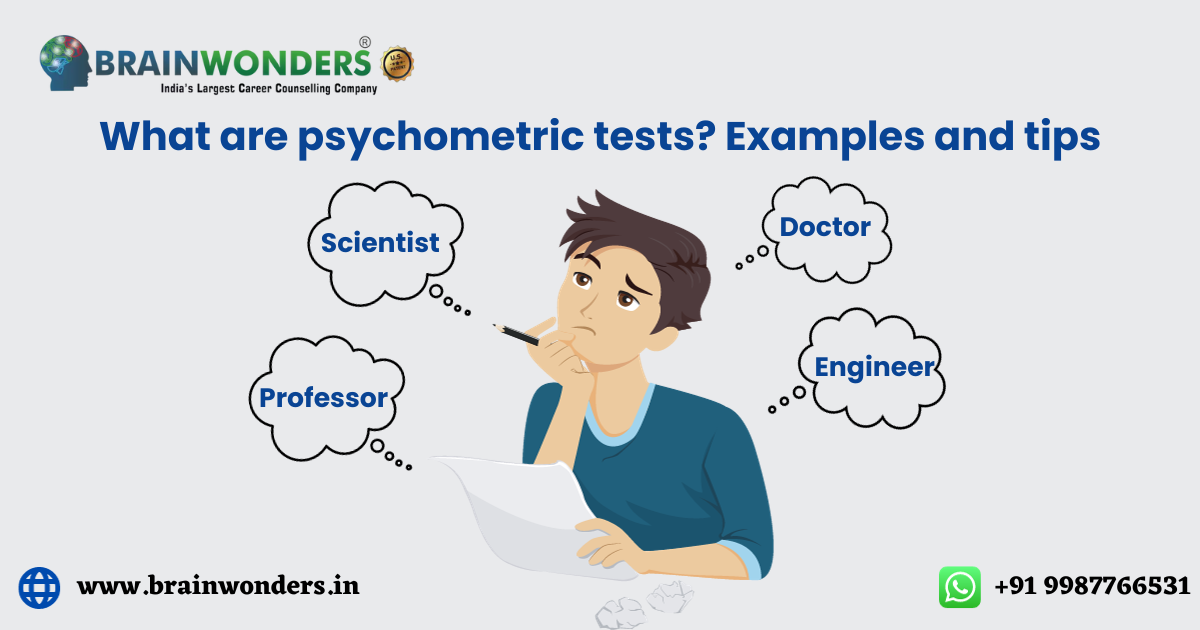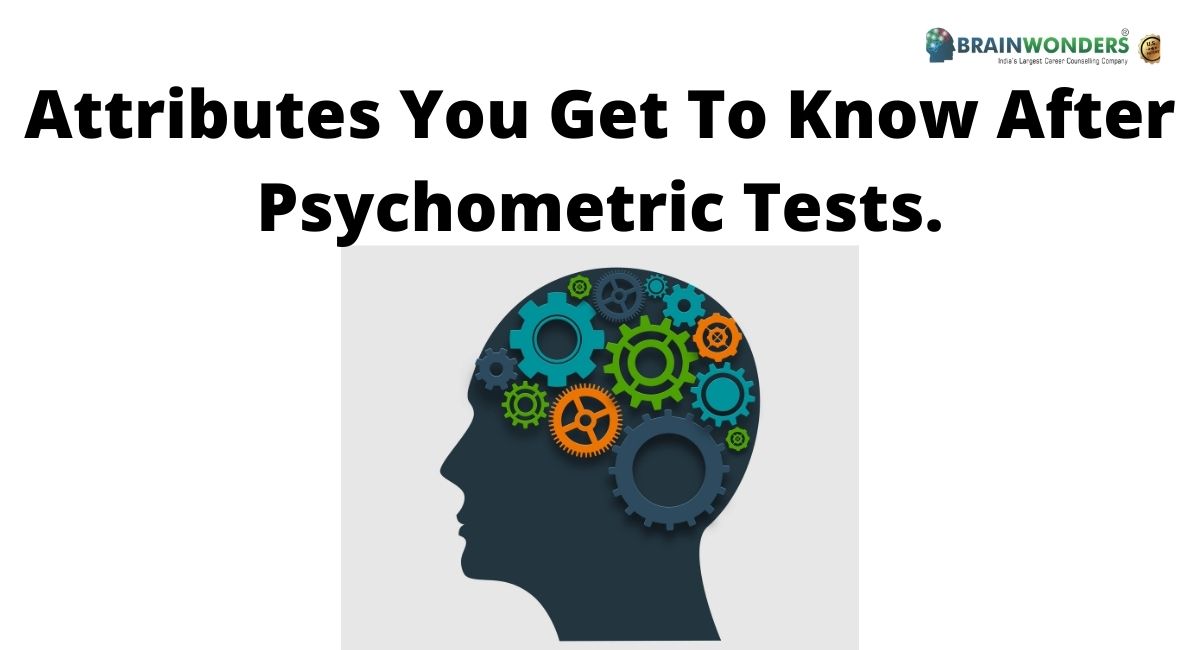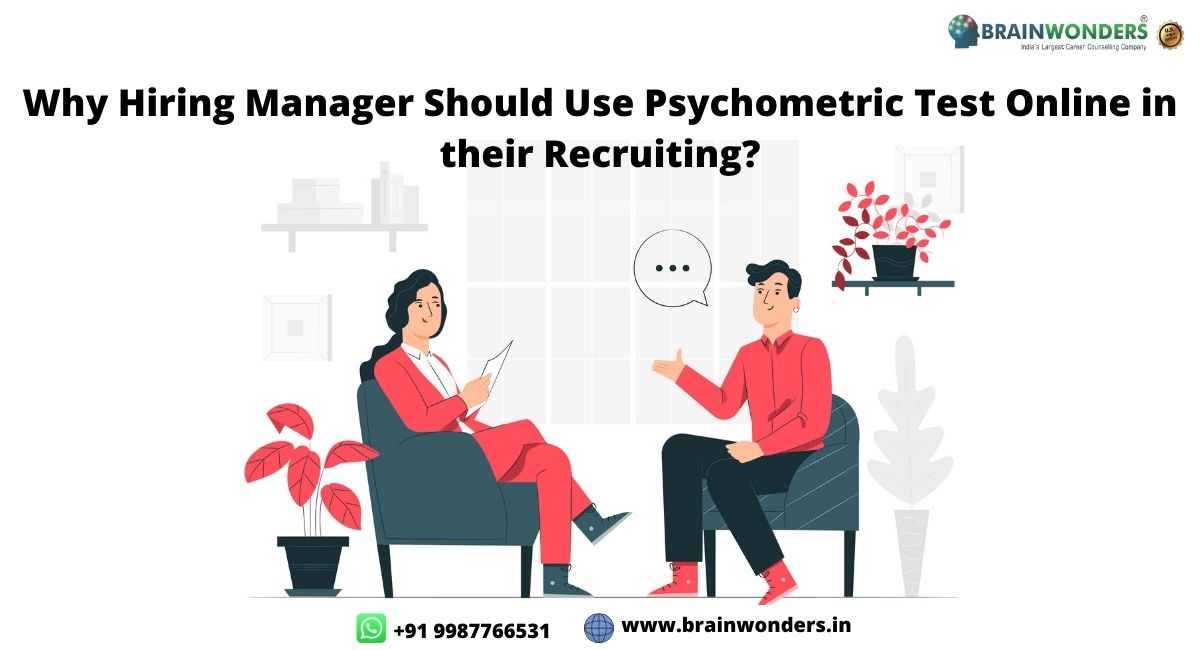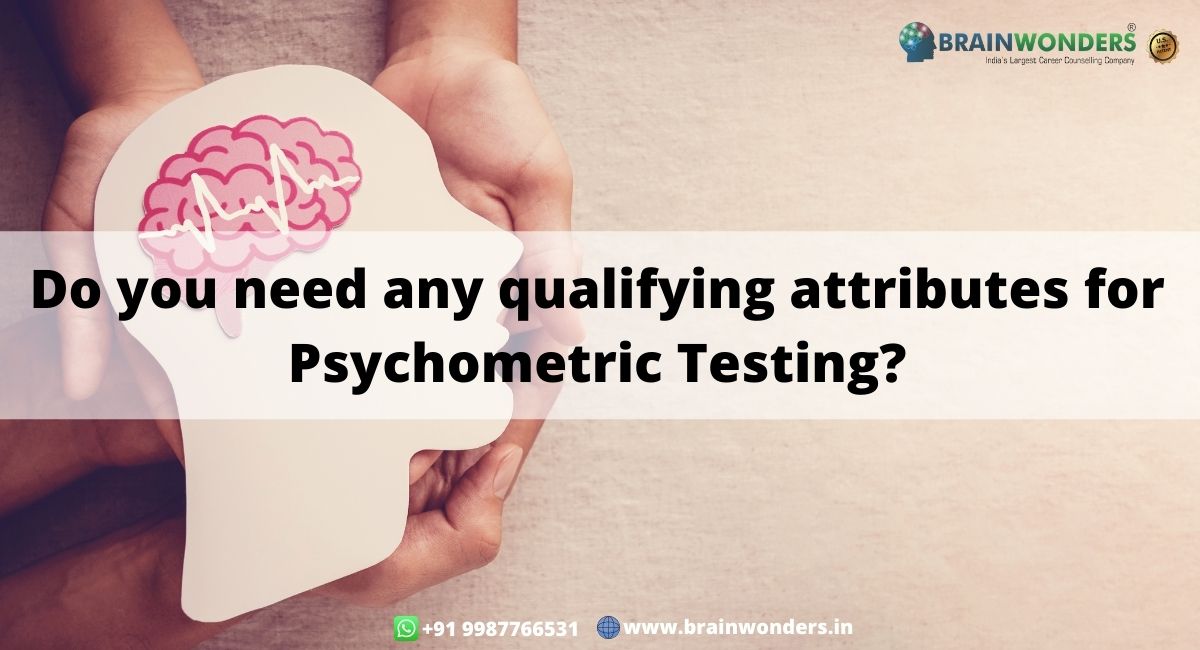
Clear All Your Query with Brainwonders Expert

Are you aware which subjects and courses will bring you closer to your dream career?
Worry not, because the Brainwonders test and guidance will not only help you know it, but also follow it!
Blog
02 January,2024 | By Brainwonders

Psychometrics, a scientific discipline, focuses on the theory and methodologies of assessing personality traits and cognitive abilities through various tests, measurements, and models. The application of psychometric testing extends to diverse fields such as education, psychology, psychiatry, and recruitment, where it evaluates cognitive abilities, personal traits, and mental health status.
In recent years, integrating psychometric testing into hiring practices has become commonplace. Many companies now incorporate online psychometric tests as an integral component of their recruitment and selection processes.
While psychometric testing can be a valuable tool for gauging the strengths and capabilities of candidates, it is essential to exercise caution in its application. It should not be the sole method for evaluating the skills of individuals.
This article explores the role of psychometric testing in the context of hiring and managing workplaces.
A psychometric test comprises a set of assessments crafted by qualified experts, such as psychologists or psychometrics specialists, to evaluate cognitive ability, personal traits, and mental health status.
In recruitment, psychometric tests are found to be extensively useful in assessing skills and abilities that are challenging to evaluate through interviews or glean from candidates' cover letters and resumes. An illustration of this is the assessment of employee integrity.
Start Your Career Journey Today - Click Here!
Psychometric tests are commonly employed during the recruitment and hiring phase, but their utility extends beyond this initial stage to various points in an employee's journey.
Companies incorporate psychometric tests to gain insights into individuals' abilities, traits, and potential in job performance assessments, employee development initiatives, and promotion considerations.
Management teams leverage psychometric testing to evaluate team dynamics, identify strengths and weaknesses, and adapt their leadership styles to align with their employees' diverse personalities and traits.
Additionally, HR managers may utilize psychometric testing as a pivotal component in leadership assessments. This helps evaluate the capabilities of the company's management team and explore avenues for improvement, contributing to a strategic approach to enhancing leadership effectiveness.
Find out what you could be great at - Call us Today!
Psychometric tests can assess an extensive range of skills, aptitudes, and traits, which, as highlighted earlier, can be broadly categorized into two major groups: cognitive abilities and personal characteristics.
Let's delve into each category.
You can measure different types of cognitive abilities with tests, for example:
You can also assess personality traits, behaviour, and motivation:
In addition to the above, psychometric tests can also find application in a medical context to gauge someone's mental health status. In this scenario, they are utilized by a trained professional as part of a comprehensive assessment.
Broadly, psychometric tests can be categorized into two main groups:
Let's briefly examine each category.
Cognitive ability tests assess particular skills and capabilities relevant to the vacant position you aim to fill. These tests can evaluate a range of mental abilities, including:
Certainly, IQ tests fall under the category of psychometric cognitive ability tests but require administration by trained professionals.
Various IQ tests exist, including the Wechsler Adult Intelligence Scale (WAIS), the Stanford-Binet Intelligence Scales, and the Woodcock-Johnson Tests of Cognitive Abilities.
In recruitment, IQ tests are not widely utilized and may be deemed unethical. Companies typically favour alternative cognitive ability tests or game-based assessments. An example of the latter is IBM's Cognitive Ability Assessment.
Personality tests, exemplified by assessments like the Big Five (OCEAN) and DISC, gauge:
Attitudes and behaviour within specific contexts, particularly in novel and unfamiliar situations.
Values, including honesty and integrity, which significantly influence an individual's conduct, can also be gauged.
Motivation is a variable aspect unique to each person. Some individuals may derive their primary motivation from acknowledgement and team camaraderie, while others excel when witnessing the positive outcomes of their efforts.
It's essential to note that personality tests are not intended for standalone assessment but should instead be integrated into a well-defined strategy that considers factors like company culture, team unity, and diversity.
While they can offer insights into job performance, their predictive capability is enhanced when combined with other cognitive assessments.
Certain companies, like IBM, utilize game-based tests to evaluate candidates' cognitive abilities. These assessments fall under psychometric tests and require applicants to solve puzzles, arrange numbers, compare shapes, and undertake similar tasks. They are timed, and the difficulty level escalates with each completed puzzle.
Game-based tests serve as a valid assessment and can offer insights into job performance to a certain degree. While some candidates find them engaging, a significant portion experiences stress due to the imposed time constraints. A quick perusal of Reddit reveals that not all IBM candidates have had a positive experience with the cognitive ability assessment.
Therefore, careful design and selection are crucial if you incorporate game-based tests. Alternatively, standard cognitive ability tests assessing skills like numerical reasoning, spatial reasoning, intermediate math, and others can be considered.
Establishing clear expectations and providing ample information about the hiring process is essential to ensure a positive candidate experience.
Companies leverage personality tests to gain deeper insights into candidates' personalities and predispositions to assess their potential cultural fit and predict future success. While the traits that effectively predict performance vary depending on the specific position, some exhibit universal significance.
Let's delve into the specifics:
Conscientiousness Conscientiousness, denoting an individual's ability for self-discipline, organization, and diligence, is a relatively accurate predictor of performance across various roles and industries, particularly in less complex jobs like customer service. However, its correlation could be more robust for executive and other high-complexity positions. The Big Five (OCEAN) test, which evaluates conscientiousness, extraversion, agreeableness, openness to new experiences, and emotional stability, is one of the most extensively studied psychometric tests in the workplace. A 2019 meta-analysis by Michael P. Wilmot and Deniz S. Ones affirms conscientiousness as a potent predictor of workplace success.
Extraversion Positions such as leadership, marketing, or consultancy roles align well with extroverted candidates. Contrary to the common belief that extraversion is imperative for sales success, Adam M. Grant from the University of Pennsylvania suggests that ambiverts who fall in the middle of the extraversion vs. introversion continuum may have an advantage in sales positions compared to pure extroverts.
Openness to Innovation In dynamic environments prioritizing Innovation, such as tech companies, startups, and disruptive businesses, an openness to new ideas and concepts becomes crucial. This trait contributes to the thriving of both employees and companies in such settings.
The brief answer is that it varies.
Psychometric tests can yield high accuracy when appropriately designed and administered by qualified professionals who select the right tests for the specific role and provide applicants with sufficient context. This approach enhances the likelihood of obtaining candid responses and ensuring a positive candidate experience. Moreover, the interpretation of results necessitates careful analysis by trained HR personnel.
According to Deniz S. Ones from the University of Minnesota, Twin Cities, when used appropriately, tests can be a potent tool to evaluate whether an individual is a suitable fit for a given role.
However, not all tests are intended for use in hiring contexts. For instance, the widely-used Myers-Briggs Type Indicator (MBTI), also known as the "16 personalities test," is not designed for hiring decisions, as stated by the Myers-Briggs Foundation. If you choose to employ this test or similar personality assessments, it should be utilized solely to gain better insights into your candidates rather than as a standalone evaluation tool.
Psychometric tests are not designed to provide a 100% accurate assessment. They should not be solely relied upon to predict future job performance, as they are more aligned with overarching qualities and abilities rather than specific skills and expertise in particular domains. Instead, they are most effective when incorporated as part of a comprehensive hiring strategy alongside structured interviews (such as those utilized in Google's hiring process) and other skill assessments.
For instance, even if an individual demonstrates high conscientiousness, extraversion, and creativity, it does not automatically guarantee suitability for a role like a marketing director. Hence, psychometric tests are most valuable when used with job-specific skill assessments. This combined approach provides a robust understanding of an individual's capabilities, enabling a thorough review of their resume and better preparation for a structured interview.
While psychometric tests offer supplementary data and assist hiring teams in understanding a candidate's strengths better, their effectiveness hinges on the quality of information the candidate provides—in other words, the accuracy of their responses. These tests contribute an additional layer of information to the overall assessment. Still, they cannot substitute for insights from an experienced hiring manager or a well-crafted hiring strategy.
Take, for example, the Big Five (OCEAN) test, designed as a straightforward method to gauge where individuals fall on a continuum of five key traits: extraversion, conscientiousness, agreeableness, neuroticism, and openness to experience. Specific behaviours or personal characteristics are assessed and grouped into clusters linked to each trait. The test's accuracy is contingent on its simplicity, as Scientific American highlighted: the reliability of the results depends entirely on the accuracy of the information provided by the test-taker.
Candidates can influence results to some extent; they might tailor their responses to align with what they perceive as the expected outcomes. This is particularly true for personality tests, as emphasized by SHRM.
In highly competitive job markets, candidates are likely to conduct thorough research and may strive to present a more favourable image of themselves, particularly when undergoing personality assessments.
While the impact on the results of cognitive tests is more challenging to manipulate, candidates, through extensive training, may still enhance their performance. However, this isn't necessarily a drawback—someone exhibiting high motivation and a drive to succeed will likely display a similar determination to excel in the job.
Similar challenges can be encountered with resumes and cover letters. According to a 2019 survey by Monster, 85% of recruiters agree that candidates tend to exaggerate their skills and competencies on a resume.
Developing a comprehensive hiring strategy that integrates psychometric tests with various other tools and techniques is imperative to address these factors. This approach ensures a detailed and thorough understanding of the skills and abilities of each candidate.
Psychometric tests offer numerous advantages, making them a valuable tool for hiring.
Psychometric tests are not infallible tools; they have limitations and drawbacks that warrant careful consideration. Let's explore the disadvantages of psychometric tests.
In summary, while psychometric tests offer valuable insights, they should be utilized judiciously and as part of a broader hiring strategy to mitigate these inherent drawbacks.
Enhance your hiring process by incorporating psychometric testing through the following steps:
Brainwonders offers an extensive array of psychometric tests designed to streamline your hiring process and aid in selecting the most suitable candidates. Each test is timed, lasting 10 minutes, and predominantly features multiple-choice questions.
This section provides examples from Brainwonders test library, demonstrating their applicability to various roles in your hiring process. While it's imperative to analyze each specific position and outline precise requirements, the following examples offer quick insights into potential applications of different skills assessments.
Let's explore a few examples of cognitive ability tests, a subtype of psychometric assessments:
1.Verbal Reasoning:
2. Mechanical Reasoning:
3. Spatial Reasoning:
4. Numerical Reasoning:
5. Attention to Detail (Visual):
In our test library, we offer various personality tests, including:
1. DISC Test:
2. The Big 5 (OCEAN) Test:
3. 16 Personalities Test:
Using these personality tests in conjunction with other assessments, tools, and methods is essential to comprehensively understand each candidate's capacities and personality traits.
Psychometric tests can enhance your hiring process and establish a data-based recruitment strategy. However, employing these tests carefully is crucial to ensure a positive candidate experience and gather accurate data.
Brainwonders optimizes the utility of psychometric tests by offering a diverse range of assessments, engaging subject-matter experts in test creation, continuously enhancing test quality, and prioritizing the candidate experience to contribute to building a positive employer brand.
Our tests, crafted by subject-matter experts, undergo peer review to ensure effectiveness and alignment with test goals, providing accurate results.
Candidates can take our timed tests in a low-stress environment at their convenience, mitigating the stress typically associated with formal interviews. Additionally, the ability to personalize tests with your logo and brand colours fosters a cohesive and branded experience for candidates.
Psychometric tests are important for things like hiring and education, but it's crucial to use them carefully. Plan how to use them in your process. After understanding how they help and what they measure, check out the tests at Brainwonders. If you have questions, you can contact us for career counselling, online or offline. Brainwonders, a 5-time national award winner, is recognized as the best career counsellor in India. Their team is reputed for providing exceptional guidance across all age groups, utilizing innovative techniques such as the US Patented DMIT or Online Psychometric Tests like IQ and Aptitude Test. Individuals can confidently embark on fulfilling and contented career paths with their assistance without facing any challenges.
Frequently asked questions about psychometric tests.
Q1. What are psychometric tests?
Ans: Psychometric tests comprise a series of assessments crafted by qualified professionals, typically psychologists or psychometrics experts. These tests evaluate cognitive ability, personal traits, and mental health status. Brainwonders provides a platform for accessing psychometric testing.
Q2. What can psychometric tests measure?
Ans: Psychometric tests can measure diverse skills, aptitudes, and traits. These can be broadly categorized into two major groups: cognitive abilities and personal characteristics.
Q3. Are psychometric tests accurate?
Ans: The accuracy of psychometric tests depends on the correct design and administration by qualified professionals. Ensuring the appropriate selection of tests for specific roles and providing applicants with sufficient context significantly contributes to their accuracy.
Are you aware which subjects and courses will bring you closer to your dream career?


